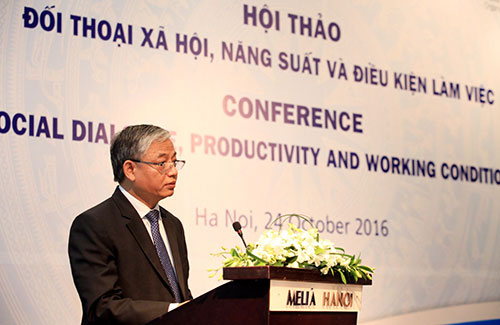Ministry lets workers decide on raising overtime cap
 |
| Doan Mau Hiep - photo source: molisa.gov.vn |
Deputy Minister of Labour, Invalids and Social Affairs Doan Mau Diep told VIR about this plan on the side-lines of the conference on social dialogue, productivity, and working conditions held today in Hanoi by the State Secretariat for Economic Affairs of Switzerland (SECO), the International Labour Organisation (ILO), and the MoLISA.
“The ministry is going to work with the General Confederation of Labour to survey workers throughout the country,” he confirmed. “We are going to propose raising the cap but any change needs to be subject to general agreement amongs workers and employers.”
Under the Labour Code, which took effect in 2012, a worker can work a maximum of 200 hours overtime per year, and 300 hours per year in special cases stipulated by the government, equal to half of the 600 hours a year recommended by the ILO.
The MoLISA is in the process of drafting amendments to the 2012 Labour Code, including the overtime cap. As planned, the draft amendments will be submitted to the National Assembly for discussion in May 2017. If everything goes smoothly, they can be adopted in October next year.
The conference on social dialogue, productivity, and working conditions is a forum for the Vietnamese government, the ILO, as well as business communities, workers’ organisations, and other stakeholders to review the country’s legal and institutional framework to improve productivity and working conditions, and to design and implement more effective policies in this area.
According to a study produced by the ILO, productivity in Vietnam is among the lowest in the Asia-Pacific. Though working conditions have been improving, serious limitations remain, especially in the informal areas, and the country’s inspection capacity is limited in quantity and quality. Social dialogue, particularly at the enterprise level, is still only a formality.
| RELATED CONTENTS: | |
| Overtime cap to increase | |
| Overtime cap to remain firmly in place | |
| Poor health blamed for overtime cap | |
What the stars mean:
★ Poor ★ ★ Promising ★★★ Good ★★★★ Very good ★★★★★ Exceptional
Latest News
More News
- Congratulations from VFF Central Committee's int’l partners to 14th National Party Congress (January 25, 2026 | 09:46)
- List of newly-elected members of 14th Political Bureau announced (January 23, 2026 | 16:27)
- 14th Party Central Committee unanimously elects To Lam as General Secretary (January 23, 2026 | 16:22)
- List of members of 14th Party Central Committee announced (January 23, 2026 | 09:12)
- Highlights of fourth working day of 14th National Party Congress (January 23, 2026 | 09:06)
- Press provides timely, accurate coverage of 14th National Party Congress (January 22, 2026 | 09:49)
- Press release on second working day of 14th National Party Congress (January 22, 2026 | 09:19)
- Minister sets out key directions to promote intrinsic strength of Vietnamese culture (January 22, 2026 | 09:16)
- 14th National Party Congress: Renewed momentum for OVs to contribute to homeland (January 21, 2026 | 09:49)
- Party Congress building momentum for a new era of national growth (January 20, 2026 | 15:00)
















 Mobile Version
Mobile Version